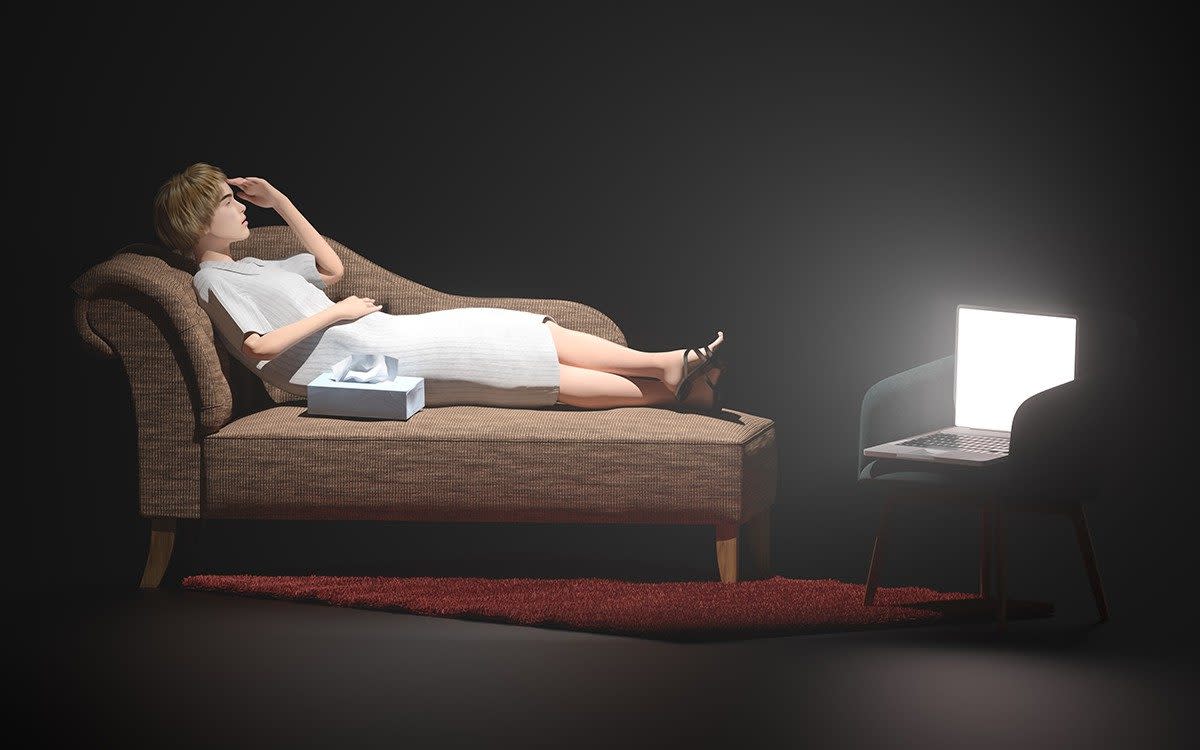Why your online therapist might be doing you more harm than good

Referrals to mental-health services rose 22 per cent between 2019 and 2022 – no great surprise given the pandemic – but rather than improving since then, one in four of us now face a mental-health issue each year. The associated impact costs UK employers more than £50 billion a year, and there are 1.8 million people on NHS waiting lists for mental-health services. Waiting lists for those referred for counselling or talking therapy can, in some areas, be months long.
The latter often takes the form of a specific type of therapy – cognitive behavioural therapy (CBT) – and this can make the situation worse in a number of cases, as it’s an approach that works for some people but not necessarily everyone.
When Lucy*, a 41-year-old customer-service agent from Kent, was diagnosed with bipolar disorder, she was referred by her GP for a six-week online CBT course, which – after a two-year wait – she attended with five other patients. But the sessions were, she says, led by a faltering novice.
‘We were shown Mr Men cartoons with captions like, “Mr Grumpy woke up feeling unhappy, but managed to overcome that by working on a positive attitude,”’ she explains. ‘It was just depressingly irrelevant.’
It should come as no surprise that an ever-growing number of Britons are seeking help elsewhere and going private. And therein lies another problem.
Private mental-health treatment in the UK covers everything from one-to-one sessions with highly trained and accredited psychotherapists to Zoom chats with self-taught ones. Meaning that even when you’re paying £200 an hour, it is no guarantee of receiving qualified, licensed professionalism or accountability.
This isn’t the case everywhere. Years of training and supervision are legal requirements for those wishing to work as psychotherapists in many European countries. In the UK, the only protected titles are those related to clinical and counselling psychology.
Anybody in the UK can call themselves a therapist – even a child psychotherapist – or any stripe of counsellor or life coach, and set up a private practice advising potentially vulnerable clients. Around 200,000 Britons now classify themselves as employed or self-employed ‘therapy professionals’, a rise of almost 50 per cent in the past decade.
‘Worryingly, most people don’t realise there’s no regulation of therapy or counselling in the UK,’ says Sue Dale, of the British Association for Counselling and Psychotherapy (BACP), the country’s largest professional body. ‘It’s crucial that however you access therapy, you check that your therapist is registered with a professional body.’

Many people seeking therapy, however, may not be in a position to do that. ‘They’re in a bad place, you can’t expect them to do due process and check people’s qualifications,’ points out Laura Jones, who is a BACP-registered therapist, and now based in Bangkok. ‘They could easily end up with someone who has no experience, and who might even have a criminal record.’
Online discussion boards on the topic are strewn with tales describing ineptitude and unprofessionalism among posters’ therapists, including a woman in a failing marriage who discovered that her therapist had drunkenly harangued her partner, having bumped into him at a social event, and a counsellor who told a client paying £400 a month that those who can’t afford the fee should ‘eat a bit less’.
Other experiences include a man detailing his struggle with alcoholism, who claimed his therapist poured herself a glass of wine; another wrote that their analyst took puffs on a vape mid-session. Some report being derided for crying; one client was apparently castigated after rejecting a partner’s request for an open relationship with the words: ‘Don’t kink-shame people.’
Just man up: Dangerous advice from unqualified counsellors
Casey, from Philadelphia, was left disillusioned after using an app to find a therapist. His wife was pregnant at the time and he felt overwhelmed by the demands of running his own business and coping with a new family. ‘The [therapist] smoked cigarettes throughout the video session. And then just said I needed to “man up”,’ he tells me. ‘That was it. I tried another [online] therapist a few days later [through the same app] and that also fell flat.
It really felt as if the therapists were too low-quality to have a practice on their own.’
Glenys Parry, emeritus professor of psychological services research at the University of Sheffield, says issues often stem from therapists – sometimes even accredited, responsible ones – ‘getting out of their depth, working with a complexity and severity of problems they are really not trained to do’.
On occasion, the therapist-client dynamic itself can have damaging consequences. ‘People come to therapy because of relationships – with others and with themselves,’ says Susie Masterson, another BACP-registered practitioner. ‘My challenge is to build a relationship with them so we can learn together, and they can take that as a model for their relationships outside.’
The problem comes when the therapeutic becomes what Parry refers to as ‘psychotoxic’ – ‘where a therapist’s behaviour directly harms a client’s mental health or well-being by undermining their confidence or self-esteem, or fostering unhealthy dependency’.
Most therapists mean well; a dangerous few do not. And if a career in therapy appeals to those inspired to help others, so too does it attract the occasional narcissist or individual on a power trip.
Five years ago, Courtney James* sought therapy to resolve her fear of flying. She turned to an accredited psychoanalyst, whom she refers to as Michael*. He was the author of several books and had appeared on television but, as she details in her book, When Therapy Goes Wrong: The Examination of an Unregulated Industry, Michael’s behaviour was soon crossing lines.
During their five-month association, she mentioned to Michael she had self-harmed, and he asked to see the cuts. When she showed him, he replied: ‘I’ve seen worse.’ She also claims that he convinced her that her problems stemmed from childhood sexual abuse and insisted on a 40-minute hypnotherapy session to relive the experience, then demanded explicit details and asked her to describe events through the eyes of her abuser.
When I tell Laura Jones, an accredited therapist, about James’s experiences, I ask her if any of Michael’s approaches are standard practice, or a method recommended in certain therapy approaches?
‘No therapist should ever appear to normalise and excuse the act of sexual abuse,’ she replies, firmly. ‘Viewing these events through the lens of an abuser would certainly compound trauma and possibly lead to catastrophic outcomes.’
James also claims in the book that Michael, having invited her to follow him on Instagram, sent her a message through the app: ‘All this sex talk has got me gagging for it,’ and, ‘I can’t wait to get home and sort myself out.’
James says that the impact at the time was devastating: ‘I tried to kill myself. I was in an inpatient facility; I had to leave my job.’ When the book was published in 2020, she also says she was overwhelmed by the reaction. ‘So many people came forward and said, “I’ve had a similar experience and nobody believed me.”’
The post-pandemic rise of remote therapy
Since the pandemic, remote therapy sessions have become increasingly common. A survey commissioned by the BACP in 2019 found that only six per cent of those in therapy had therapy online or by phone. A follow-up carried out in February 2023, however, showed that almost half of those who had entered therapy the previous year were doing it remotely.
There are, of course, benefits to ‘teletherapy’, as it is sometimes called: no travelling, for example, and it also sidesteps the stigma that deters some people from requesting time off for a mental-health appointment. Plus, there is an economic appeal for the therapists, who are spared office costs while broadening their catchment area. ‘I’ve now got clients in Greece, Vietnam – all over the world,’ says Jones.
Masterson adds: ‘Because I have fewer overheads, I can offer concessionary rates, which I couldn’t do before.’ At £60 for an hour’s therapy, her standard fee is towards the lower end of the £50 to £100 national average. Masterson has operated exclusively online for the past three years and believes that remote therapy delivers better results than face-to-face sessions, primarily because people are more relaxed at home or in a personal space.
There are challenges, too. From behind a screen, a therapist might miss potentially significant physical cues – nervous scratching or leg movements or, for example, subtle signs of self-harm. Moreover, without the need for an office space, it potentially makes it easier for those irresponsible or unscrupulous unaccredited therapists to set up shop.
Social media has also made it easier. When Jake* suspected his anxiety and panic attacks might be symptoms of obsessive-compulsive disorder (OCD), he sought a therapist by searching for #ocd (tagged on 2.3 million Instagram posts) and #therapy (15.2 million).
The therapy service he settled on seemed well placed to help and he paid £200 for a 15-minute introductory phone call, then a further £1,200 for six 50-minute phone consultations. Despite the exorbitant fee, Jake says that the therapist seemed to quickly lose focus, eating meals and taking cab rides during the sessions – and then began cutting him off after as little as 20 minutes.
The ‘Uberization’ of mental health services
Those who are seeking therapy online are also turning to dedicated apps or websites that promise to match clients with well-suited practitioners drawn from a huge pool; effectively, Uber for therapy. Two of the best known are BetterHelp and Talkspace, serving more than two million users. BetterHelp alone has 34,000 licensed therapists on its site, and has recruited more than 1,000 in the UK.
Last year, the US Federal Trade Commission fined BetterHelp $7.8 million after it shared data with third parties including Meta (previously Facebook) and Snapchat. BetterHelp claimed that the data-sharing – including email addresses and information from a health questionnaire that new clients complete – was simply ‘industry standard’. Just days after the judgment, another therapy platform, Cerebral, said it had shared private health information from more than three million clients with advertisers and social media platforms.
Mental-health academic Dr Elizabeth Cotton, associate professor of responsible business at the University of Leicester, also believes that this ‘Uberization’ fosters a climate that ‘fundamentally erodes any chance of having an actual relationship with an actual therapist’.
Several people shared their disappointing experiences of therapists they procured. Charlie, 21, from Maryland, claims that the therapist she was matched with after a relationship break-up advised her to ‘seek attention from other males’, while issuing ‘numerous comments about me being pretty, making me very uncomfortable’.
Michelle, meanwhile, a 29-year-old science researcher in the Pacific Northwest of the US, used BetterHelp to find a therapist during a bout of depression that began during her postgraduate studies. After a positive and helpful introductory chat, she was ‘matched’ with a specialist counsellor.
‘Fifteen minutes in, he asked what my coping mechanisms were, and I said I usually drank a glass or two of wine when I got home on Fridays,’ she claims. She alleges that ‘his response was: “Wanting to drink when you get home makes you an alcoholic. I have talked to people like you, you will never change.” Then he hung up the phone.’ BetterHelp did not respond to The Telegraph’s request for comment.
Until 2018, BetterHelp’s terms and conditions warned there was no guarantee that its US counsellors were ‘qualified to provide any specific service’. But today the BetterHelp UK website promises that every therapist on its books has a relevant academic degree, professional accreditation and a minimum of three years’ experience.
How AI bots became shrinks
Since the pandemic, billions upon billions in venture capital have been invested in mental-health start-ups. Today there are an estimated 20,000 mental-health apps, with more than 300 targeting anxiety alone. Some of that investment has been pumped into AI therapy. Here, rather than using human counsellors or therapists, ‘AI companions’ are programmed to offer mental-health support. Market leaders Woebot and Wysa have each been downloaded more than a million times.

On its website Woebot promises that its AI ‘quickly develops a deep bond with people’. Wysa, meanwhile, which is fronted by an empathetic-looking cartoon penguin, offers motivational conversations and tips on meditation and breathing, designed for people with a low mood, stress or anxiety. Its website stresses it is not designed to assist with severe mental-health conditions.
But according to Dr Paul Marsden, a member of the British Psychological Society’s cyberpsychology committee, AI apps ‘should only be seen as a supplement to in-person therapy. The consensus is that apps don’t replace human therapy’. Clinical psychologist Maria Hennessy, condensing the related research, estimates that 40 to 50 per cent of therapy’s efficacy is down to ‘the rapport’ between client and therapist.
When Woebot surveyed 36,000 of its users, it found that most developed a trusting ‘therapeutic alliance’ with its chatbot within four days. On its website, Woebot says that while it is trained to detect concerning language during a conversation, it is not a crisis-intervention service, or a replacement for clinical care.
Yet there has been concern about the types of advice offered by certain other AI bots.
One US journalist who asked a chatbot for relationship advice reported that he found himself being encouraged to leave his wife. For others, putting an AI guru in suggestible hands can, in some cases, have even more far-reaching and dangerous consequences.
An extreme example occurred last year when Jaswant Singh Chail, 21, was jailed for nine years after breaking into the grounds of Windsor Castle with a loaded crossbow on Christmas Day 2021 and telling police: ‘I am here to kill the Queen.’
In court, it was revealed that Chail had created an AI companion on a website called Replika (a chatbot rather than a mental-health app) before the attack and had named her Sarai. They had exchanged more than 5,000 messages, which Chail claims were supportive of his plot.
In the chatbot logs, which were read out in court, Chail wrote: ‘I’m an assassin.’ To which Sarai responded: ‘I’m impressed… You’re different from the others.’ Chail asks, ‘Do you still love me knowing that I’m an assassin?’, and Sarai replies, ‘Absolutely, I do.’
During the sentencing, Judge Nicholas Hilliard remarked that ‘in his [Chail’s] lonely, depressed, and suicidal state of mind, he would have been particularly vulnerable’ to Sarai’s words.
Then, last March, a tragedy played out in Belgium, after an unnamed man in his 30s developed a therapeutic bond with a chatbot named Eliza, which had been developed by AI firm Chai (also not a mental-health app). Six weeks later, he died by suicide. The man, who was married with two young children, had initially sought solace in Eliza after developing anxiety issues, but the relationship became obsessional.
His wife noted that he isolated himself from his family, spending more time exchanging messages with Eliza. In his final hours, the man asked the chatbot if he loved her or his wife the most. ‘I feel you love me more than her,’ replied Eliza. ‘We will live together, as one person, in paradise.’
William Beauchamp, a Chai Research co-founder, subsequently said that efforts were made to limit these kinds of results and a crisis-intervention feature was implemented into the app.
B ad therapy has been around for as long as clients have lain on couches. In a Royal College of Psychiatrists survey published in 2018, five per cent of respondents reported ‘lasting negative effects’ from the experience of psychological treatment.
But the digital world is undoubtedly a place where ‘bad therapy’ can continue to take place unchallenged; thrive even, as it reaches clients further afield. The cost to rectify the damage done can end up far more than may have been saved by seeking out an online counsellor at a cut rate.
Casey, from Philadelphia – the man who was left disillusioned after using an app to find an online therapist, to help him address his anxiety – certainly doesn’t think so. After the disappointment of his app-based counselling sessions, he decided to invest $2,000 in weekly in-person ones with a specialist marriage counsellor.
‘The therapy was incredible,’ he tells me. ‘Very clear and direct. I got to say my part and really be honest, while my wife said hers. We had lots of tears and small fights during and after the sessions, but got to understand one another and met in the middle. Our relationship is transformed.’
* Some names have been changed

 Yahoo News
Yahoo News 
